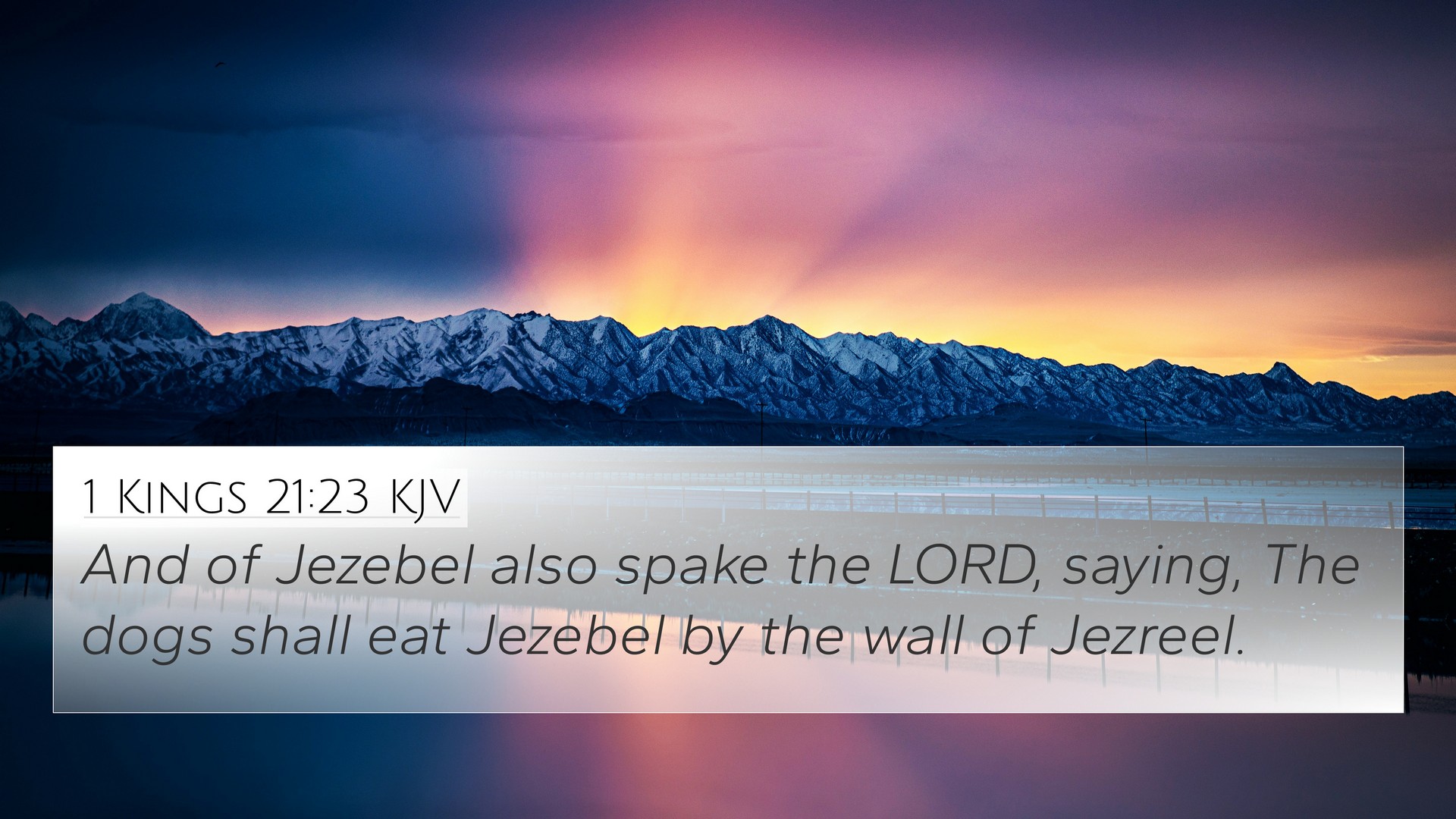Bible Verse: 1 Kings 21:23
Verse Context: This verse is part of the narrative surrounding King Ahab and the prophet Elijah, specifically regarding the evil actions of Ahab in seizing Naboth's vineyard. Ahab's unrepentant behavior led to a prophetic curse against him and his lineage.
Summary of 1 Kings 21:23 and Its Meaning
The verse reads: "And of Jezebel also spake the LORD, saying, The dogs shall eat Jezebel by the wall of Jezreel." This prophecy foretells the grim fate of Queen Jezebel, highlighting God's judgment against her wickedness.
Insights from Commentaries
-
Matthew Henry:
Henry emphasizes the divine judgment upon Jezebel for her role in Naboth's death and her continued promotion of idolatry. He points out that the phrase "by the wall of Jezreel" signifies both dishonor and a public spectacle of judgment against her tyranny. This reflects the overarching theme of God’s justice that echoes throughout the Scriptures.
-
Albert Barnes:
Barnes notes the vivid imagery in this verse, suggesting that the prophetic declaration serves as a warning to sinners about the inescapable consequences of their actions. He comments on the historical context, where the dogs eating Jezebel's body serves as a metaphor for absolute disgrace, illustrating the fate that befalls those who oppose God's commandments.
-
Adam Clarke:
Clarke highlights how Jezebel's violent actions and manipulative nature lead to her demise. He discusses the symbolic representation of dogs eating her body, emphasizing the total rejection by society and the profound dishonor of a death without burial, which was considered a grave punishment in ancient times.
Connections Between Bible Verses
This verse connects with various other scriptures that reflect on judgment, consequences of sin, and the sovereignty of God in executing justice:
- 2 Kings 9:30-37: This passage fulfills the prophecy regarding Jezebel’s death, detailing her being thrown from a window and the dogs consuming her body.
- 1 Kings 21:20: Ahab's confrontation with Elijah declares his guilt in Naboth's murder and foreshadows the consequences of his actions.
- Galatians 6:7: "Do not be deceived: God is not mocked, for whatever one sows, that will he also reap." This principle of reaping what one sows is evident in Jezebel's fate.
- Psalm 37:10-11: This psalm speaks about the eventual destruction of the wicked, paralleling the fate of Jezebel and Ahab.
- Matthew 26:24: Jesus speaks of Judas Iscariot’s betrayal, with a similar tone of inevitable judgment, linking to the consequences faced by those who betray God’s people.
- Revelation 2:20-23: This passage warns against Jezebel’s influence in the early church, illustrating her persistent legacy of sin and its repercussions.
- Proverbs 11:21: "Be assured, an evil person will not go unpunished," encapsulates the certainty of divine justice, as demonstrated in this narrative.
Thematic Bible Verse Connections
Through a comparative Bible verse analysis, the themes of divine retribution and the consequences of immorality link 1 Kings 21:23 to various teachings throughout both the Old and New Testaments. Here are a few connections:
- Rebellion Against God: 1 Samuel 15:23 mentions that rebellion is akin to witchcraft, relating to Jezebel's idolatry and manipulation.
- Wicked Counselors: Proverbs 12:5 speaks to the righteousness of the plans of the righteous compared to the wicked counsel of those like Jezebel.
- God's Patience and Justice: Romans 2:6 states that God “will repay each person according to what they have done,” resonating with Jezebel's impending judgment.
Tools for Bible Cross-Referencing
Understanding the connections between Bible verses can be enhanced using several tools and methods. Here are some resources:
- Bible Concordance: A comprehensive tool to locate scriptures and their cross-references.
- Bible Cross-Reference Guide: Guides that provide thematic associations among various scriptures.
- Cross-Reference Bible Study: Methods for in-depth exploration of interconnected biblical themes and messages.
Conclusion
1 Kings 21:23 serves not just as a narrative of judgment against Jezebel but also as a profound reminder of the consequences of sin. The thematic connections to other scriptures invite readers to reflect on broader biblical principles, illustrating how insights from diverse texts contribute to a deeper understanding of God's justice and morality.
As we engage in scriptural cross-referencing, we cultivate a richer comprehension of biblical themes and narratives, leading to a more profound faith and relationship with God.





